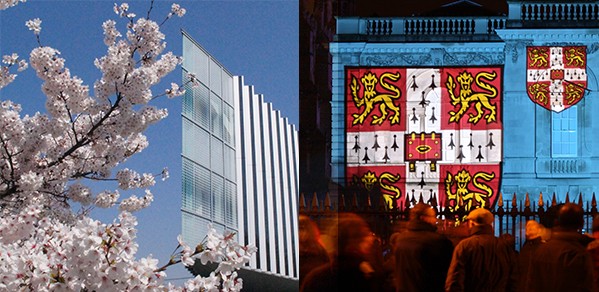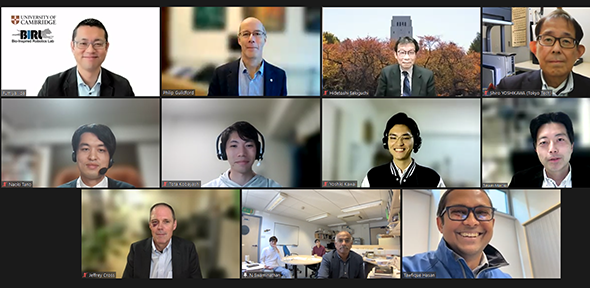
A long-running student exchange programme set up by the Department of Engineering and the Tokyo Institute of Technology has gone from strength to strength, with applications now open for next year’s summer intake.
This exchange opportunity allows us to run research projects, often leading to impressive outcomes, such as technical publications achieved during the three-month period of the student’s visit.
Professor Fumiya Iida
The Tokyo TECH – Cambridge Summer Exchange Research Programme (SERP) provides opportunities for graduate students to take part in research exchange and collaboration. The programme, which was established in 2005, offers several months of overseas study under faculty supervision.
|
The application deadline for the 2023 SERP is 9 January 2023. Cambridge graduate students interested in applying should email Professor Fumiya Iida. |
To mark the success of the 2022 SERP, an online workshop was held, attended by more than 100 faculty members and students from both universities.
An opening address was given by Philip Guildford, Chief Operating Officer of the Department of Engineering, who stated the importance of SERP and the relationship between Tokyo TECH and the University of Cambridge. He noted that Cambridge's Department of Engineering was created in 1875 and Tokyo TECH originated just six years later in 1881 – they were born when engineering emerged from the industrial revolution as an academic discipline. Professor James Alfred Ewing worked in Tokyo from 1878 to 1882, teaching engineering and undertaking research, before he returned to the UK to become the Head of Engineering in Cambridge. The bond between engineering in Tokyo and Cambridge has been strong throughout this history and continues to the present day.
Also giving an opening address was Professor Hidetoshi Sekiguchi, Dean of the School of Materials and Chemical Technology at Tokyo TECH, who echoed the importance of the ongoing relationship with the University of Cambridge since the establishment of SERP, and the potential for its future.

The workshop speakers representing SERP, the University of Cambridge and Tokyo TECH.
In addition to updates on SERP and a panel discussion involving academics from both universities, there were also SERP presentations from Tokyo TECH students who studied abroad at the University of Cambridge this summer. They included:
- Naoki Tano, Master's student, Mechanical Engineering, who visited Professor Iida’s Bio-Inspired Robotics Lab (BIRL).
He shared details of his research looking at soft robotics, particularly the “relationship between deformable mesh structure and sensitivity in gelatin strain sensors”, as well as a wider discussion on the “charms of the University of Cambridge”.
Naoki said: "In this programme, I worked on the morphology of flexible strain sensors for soft robot applications. It was a valuable experience for me to be able to devote three months to my research with colleagues from different backgrounds, who are outstanding in their research. If you have any doubts about studying abroad, I encourage you to take the first step and challenge yourself."
- Touta Kobayashi, Master's student, Mechanical Engineering, who visited Professor Nedunchezhian Swaminathan’s lab in the Department’s Division of Energy, Fluids and Turbomachinery.
He shared details of his research on machine learning for fluid dynamics, as well as a wider discussion on “how best to enjoy studying in Japan”.
Touta said: "Fluid flow simulation using machine learning is important and it is widely used to help reduce development costs and improve equipment efficiency. In Professor Swaminathan's lab, I have researched a data augmentation method suitable for predicting physical phenomena to obtain a wide range of training data. I believe that this will lead to highly accurate simulations that can be adapted under a wide range of conditions. During this study abroad programme, I was able to broaden my international perspective by interacting with fabulous students and conduct research activities under the guidance of my host supervisor. I feel that it has greatly changed the range of my career considerations."
- Yoshiki Kawai, Master's student, Materials Science and Engineering, who visited Professor Tawfique Hasan’s NanoEngineering Research Group at the Cambridge Graphene Centre.
He shared details of his research on “nanotechnology collaboration – nanofibers and graphene”, as well as a wider discussion on Tokyo Institute of Technology.
Yoshiki said: "Since I have been working on one-dimensional (1D) nanomaterials in Professor Matsumoto’s laboratory at Tokyo TECH, I decided to study abroad and join Professor Hasan’s group at the University of Cambridge due to my research interest of 2D nanomaterials. While in his group, I tried to fabricate ambient-dried 3D printed graphene oxide aerogels. This research field has huge potential for paving the way for designing many types of new energy devices such as supercapacitors and batteries using these aerogels as the electrode materials. Overall, I was pleased to work in a different research field and discuss the results with excellent researchers. This research experience has broadened my knowledge and given me a global perspective."
Summing up the workshop, Professor Fumiya Ida, said: "Every year, Tokyo TECH supports its postgraduate students for a three-month research visit to Cambridge, benefiting not only the visiting students themselves, but also the research labs in Cambridge. The Tokyo TECH students are highly trained and skilled due to the education system in Japan, which offers longer research experiences at Bachelor’s and Master’s degree level than in the UK.
"This exchange opportunity allows us to run research projects, often leading to impressive outcomes, such as technical publications achieved during the three-month period of the student’s visit. The summer projects of this year were presented in our online workshop to show the quality of the students and their impressive achievements in such a short space of time. The workshop was also an opportunity to identify the interests of Cambridge academics and students. Many expressed their interest in visiting Tokyo TECH to help strengthen Cambridge’s collaborative contributions there."

